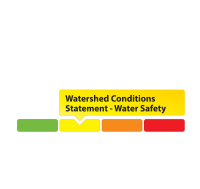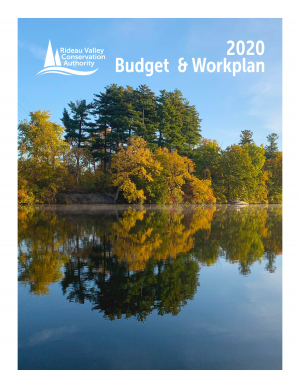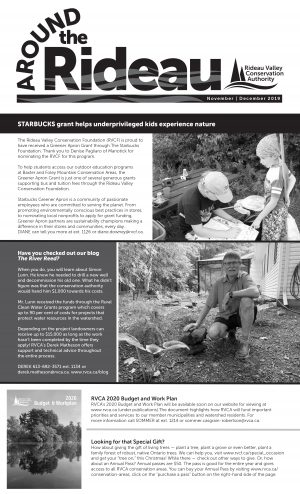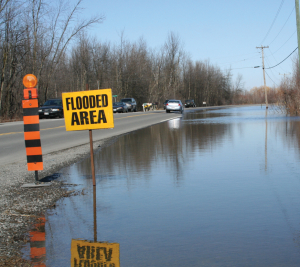Super User
Fee Schedule
- 2023 Fee Schedule
- 2024 Fee Schedule - effective January 1, 2024 (30-day notice)
Pre-Consultation Process
The RVCA and our member municipalities encourage pre-consultation in advance of submitting a formal Planning Act application. At a pre-consultation meeting, the applicant, the approval authority and the review agencies will discuss the proposal and the reports that may be necessary to support the application. The pre-consultation process assists the applicant in preparing a proposal that will meet the policies and submission requirements of the municipality, the RVCA and other agencies, potentially saving time and money.
Types of Applications
The applications reviewed by the RVCA include:
- plans of subdivision and condominium
- severances
- minor variances
- comprehensive zoning by-laws and zoning by-law amendments
- official plans and official plan amendments
- site plans
- lifting of reserves
The RVCA also participates on technical advisory committees that oversee the preparation of broader planning studies such as community design plans, master servicing studies, environmental management plans and environmental assessments. We also review applications and provide advice on applications that are submitted under the Aggregate Resources Act.
Customer Service Charter
| File | ||
|---|---|---|
| Customer Service Charter | Download | |
2020 Budget and Work Plan
ATR - November-December 2019
Local Conservation Authorities Support Recommendations in Ontario’s Independent Review of 2019 Flood Events
December 2, 2019 – Local Conservation Authorities are pleased with the findings of the independent review of the Spring 2019 flood. Retained by the Ontario Government, Special Advisor on Flooding Douglas NcNeil recognizes Ontario’s unique watershed-based Conservation Authority model and its success in minimizing flood risks and mitigating flood impacts.
Ottawa area Conservation Authorities (Mississippi, Rideau and South Nation) met with Mr. McNeil and other agencies in September to review the spring flood and discuss local experiences. Ideas were shared on how to improve protection of Ontario residents and their properties from flooding. The McNeil report contains 66 actions, and the three Conservation Authorities are pleased to see recommendations raised during those consultations in the report, including the need to:
- Update provincial guidance,
- Increase attention to floodplain mapping and the impacts of climate change,
- Conserve and restore green infrastructure like wetlands and forests that store water and reduce flooding, and
- Continue support for the role of Conservation Authorities in coordinating planning
and action.
Specifically, the report, available at ontario.ca/floodreport, encourages the Province to “consult with Conservation Authorities on their application of the natural hazards-based approach and the risk-based approach to managing flooding.”
Flood management is a shared responsibility among municipalities, emergency management officials, the Province, and Conservation Authorities. Authorities work closely with member municipalities to identify flood risk areas and to guide development activities outside of floodplains. The watershed-based approach has protected Ontarians for decades and has avoided millions in flood damages.
This approach has also built resilient communities that not only have flood control infrastructure but also important “green infrastructure” that reduces the impacts of climate change and flooding.
Local Conservation Authorities look forward to maintaining and improving flood management programs and are eager to assist the Province in implementing all of the recommendations outlined in the Flood Advisor’s report.
-End-
For more information:
Sally McIntyre, General Manager
Mississippi Valley Conservation Authority
613-253-0006 ext. 223
Sommer Casgrain-Robertson, General Manager
Rideau Valley Conservation Authority
613-692-3571 ext. 1214
Angela Coleman, General Manager
South Nation Conservation
613-984-2948
Stillwater Creek Stabilization Project
Stillwater Creek Slope Stabilization Project
RVCA was contracted by the City of Ottawa to design and implement remediation of an eroded bank of Stillwater Creek adjacent to Nautica Private and Carling Avenue and into the Ottawa River. Erosion of the slope is being caused by fluctuating flow and velocity in the creek and this project will help prevent potential slope failure.
 |
 |
|
| East Bank Erosion | East Bank Erosion |
The headwaters of Stillwater Creek begin in the National Capital Commission’s Stoney Swamp. Stoney Swamp is almost 2000 hectares in size, and is a mix of woodland, wetland and regenerating fields. From Stoney Swamp, Stillwater Creek runs through a heavily channelized and impacted area adjacent to Robertson Road. The creek turns into its natural morphology downstream of Robertson Road until the Highway 417 crossing. It then becomes channelized again, as it runs through Wesley Clover Park on Corkstown Road. The creek flows through another large wetland before Moodie Drive crossing, and from there runs parallel between Highway 417 and Corkstown Road until it turns north flowing through residential neighborhoods before emptying into the Ottawa River between the Nepean Sailing Club and Andrew Haydon Park.
The first phase to be completed is on the west bank of the creek in the treed area. The highlighted blue area is the East bank portion of the work to be completed as the second phase.
 |
| Map of the Work Area |
Further erosion of the bank of Stillwater Creek at Nautica Private could be detrimental to the properties on Nautica Private and to the safety of the residents.
Rock Toe Berm Construction
RVCA looked into multiple alternatives for the slope stabilization of the banks of Stillwater Creek. RVCA decided on the construction of a rock toe berm to stabilize the east bank of the creek. Once the design was complete, RVCA had it checked by a third-party local geotechnical engineering firm.
The rock toe berm has been designed to make a “key” at the base of the slope to be filled with large “rock protection” sized stones. The slope will then be backfilled at a 1.5:1 (h:v) slope and the large stones will extend above the creeks assumed 100-year flood elevation. The work is expected to protect the properties on Nautica Private from further property damage due to erosion.
Timing
The project took place from approximately December 2, 2019 – February 28, 2020.
Project Partners
City of Ottawa
Rideau Valley Conservation Authority
Information
Terry K. Davidson, P.Eng.
Director of Engineering & Regulations
Current Watershed Conditions
-
Watershed Conditions Statement: Forecasted Precipitation to Increase Water Levels Across Rideau Valley Watershed

(WCS – R08/2024)
August 08, 2024 – The Rideau Valley Conservation Authority is issuing a WATER SAFETY message for the entire Rideau Valley Watershed.A low-pressure system associated with remnants of Tropical Storm Debby is expected to produce heavy rainfall throughout the region. Local estimates of 50 to 100 mm of rainfall are possible beginning Thursday evening and continuing into Friday. Despite above normal precipitation over the last month, stream flows have generally stabilized at normal seasonal levels.
Although riverine flooding is not anticipated at this time, all water levels and flows across the Rideau Valley Watershed are expected to increase. Depending on the location and rainfall intensity, localized flooding in low-lying areas, including ditches and stormwater features, may be possible. Flows on the Rideau River are not expected to increase significantly.
It is advised that residents adjacent to smaller tributaries and streams take precautionary measures to protect their property, including:
- Ensuring sump pumps are clear, in good working condition and have a backwater valve
- Ensuring easy access to a portable backup generator and pump
- Ensuring downspouts are clear and the outlet is at least 3 metres from the dwelling
- Securing items that might float away as flows increase
Until the water levels and flows recede, the RVCA advises the public to exercise extreme caution around ALL WATERBODIES and remind children about the dangers of playing near open water.
This watershed conditions statement is in effect until Friday, August 16, 2024 at 5 PM or until an update has been issued.
-end-
More Information:brian [DOT] stratton [AT] rvca [DOT] ca
Contact: Brian Stratton, RVCA Manager Engineering Services
Rideau Valley Conservation Authority
613-692-6804, 1-800-267-3504 ext. 1141
brian [DOT] stratton [AT] rvca [DOT] ca
www.rvca.ca/watershed-conditions"Rideau Valley Conservation Authority is a partnership of municipalities within the Rideau Valley watershed
created under the Conservation Authorities Act to deliver a range of programs in watershed management and
natural resource conservation."
RVCA Watershed Conditions Statements:
- Water Safety – High flows, unstable banks, melting ice or other factors that could be dangerous for recreational users such as anglers, canoeists, hikers, children, pets, etc. Flooding is not expected.
- Flood Outlook – Early notice of the potential for flooding based on weather forecasts, calling for heavy rain, snow melt, high winds or other conditions that could lead to high runoff, cause ice jams and/or lakeshore flooding or erosion.
- Flood Watch – Flooding is possible in specific watercourses or municipalities. Municipalities, emergency services and individuals in flood prone areas should prepare.
- Flood Warning – Flooding is imminent or already occurring in specific watercourses or municipalities.
















